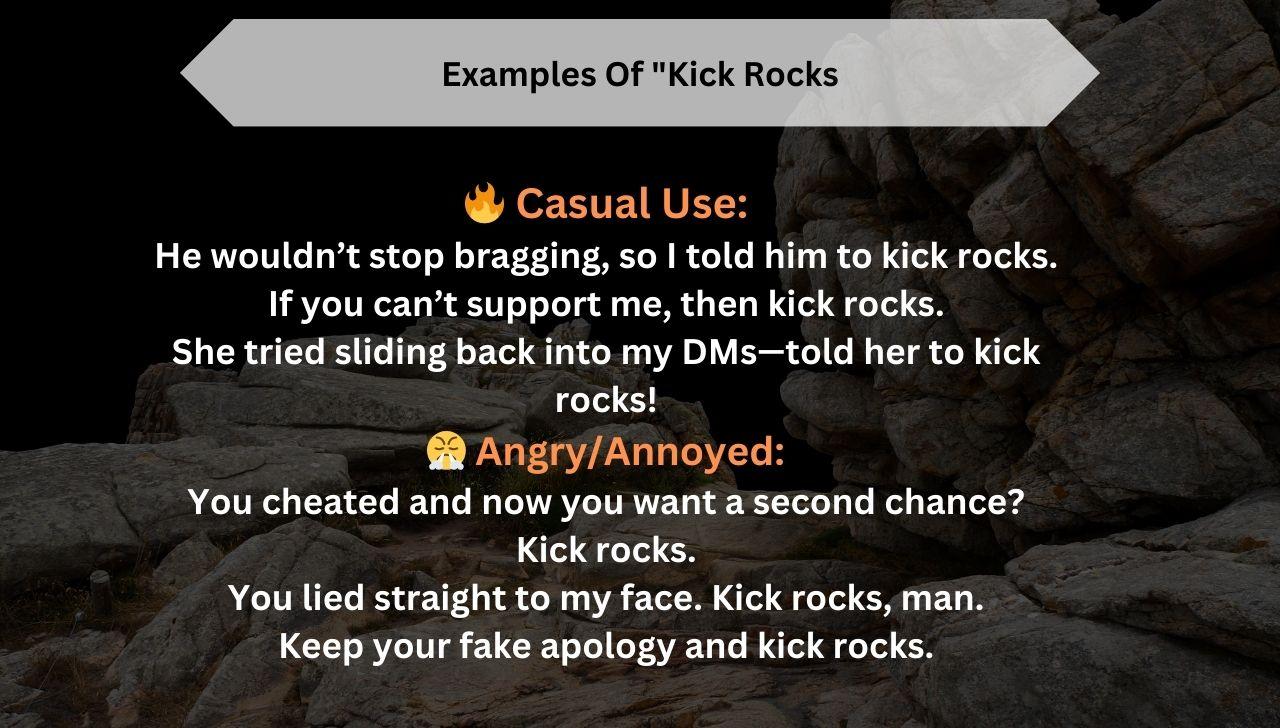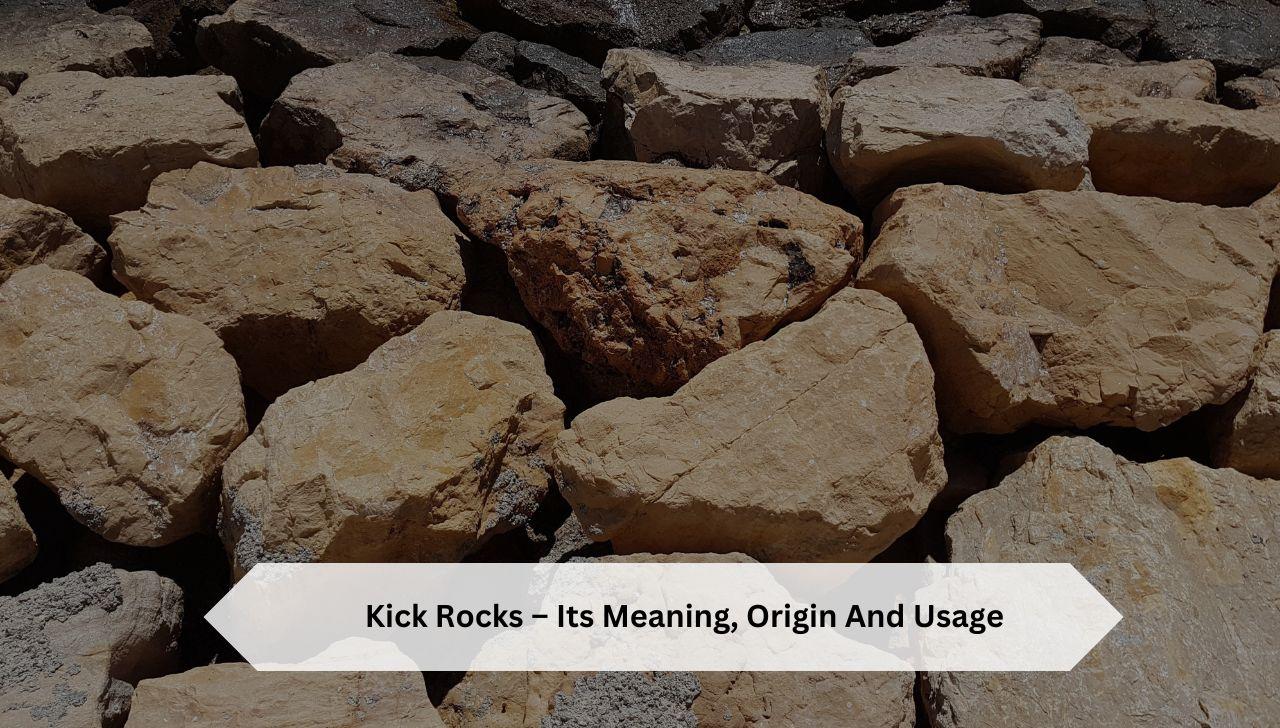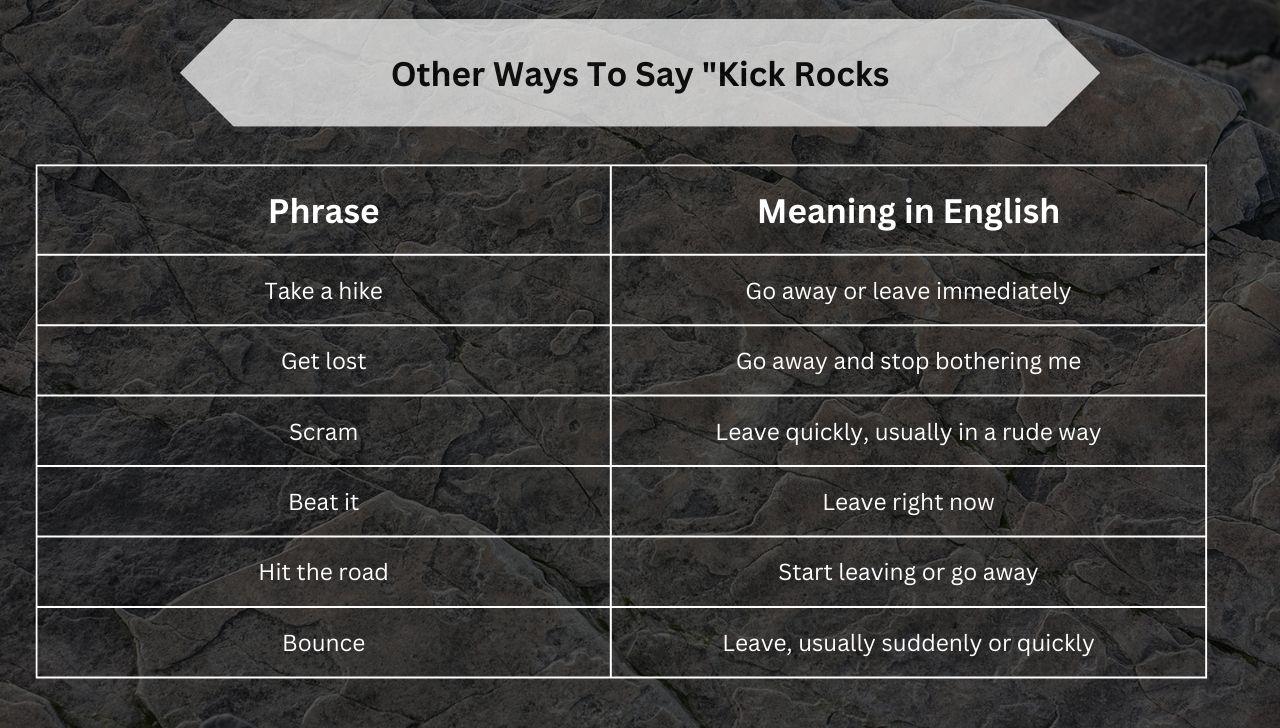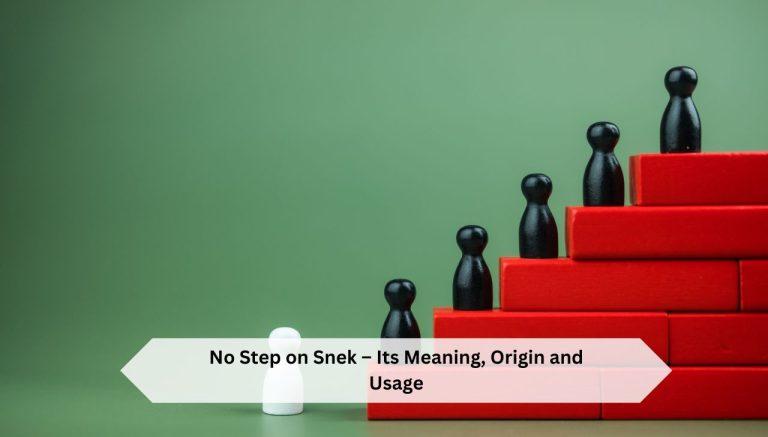Kick Rocks – Its Meaning, Origin And Usage
The Meaning Of “Kick Rocks
“Kick rocks” is a simple way to tell someone you’re annoyed and want them gone. It’s like saying, “Stop wasting my time and find something pointless to do, like kicking rocks.” This phrase makes it clear you’re fed up and the other person should just move on and leave you alone. It’s straightforward and harsh but gets the point across when you’re at the end of your patience.

Examples Of “Kick Rocks
The phrase “kick rocks” is a slang expression that usually means “go away,” “get lost,” or “leave me alone”—often used in a dismissive or annoyed tone. It can be playful or rude, depending on the context. Here are some examples across different vibes:
🔥 Casual Use:
- He wouldn’t stop bragging, so I told him to kick rocks.
- If you can’t support me, then kick rocks.
- She tried sliding back into my DMs—told her to kick rocks!
😤 Angry/Annoyed:
- You cheated and now you want a second chance? Kick rocks.
- You lied straight to my face. Kick rocks, man.
- Keep your fake apology and kick rocks.
😎 Playful or Sarcastic:
- Didn’t want to share your fries? Fine, kick rocks.
- You won’t watch my favorite show with me? Kick rocks!
- You’re team Android? Kick rocks. 😜
💔 Relationship Drama:
- Tired of the games. Either get serious or kick rocks.
- Told my ex to kick rocks when he came crawling back.
- If you can’t love me right, go kick rocks.
Or picture a teenager who keeps asking their parent for money. The parent might finally say, “kick rocks,” showing they’re annoyed and saying no. In social gatherings, if someone always brings up awkward subjects, their friends might say, “kick rocks.” This tells the person they’re not helping the vibe, and it might be better if they stepped back.
You may like this – Sneaky Link – Its Meaning, Origin, Definition and Usage
Other Ways To Say “Kick Rocks
Looking for a nicer way to say “kick rocks”? It helps keep things friendly when people disagree or are upset. There are plenty of ways to say it without making things worse. For example, you could say, “Can you give me some space?” This is a polite way to ask for some room.
| Phrase | Meaning in English |
|---|---|
| Take a hike | Go away or leave immediately |
| Get lost | Go away and stop bothering me |
| Scram | Leave quickly, usually in a rude way |
| Beat it | Leave right now |
| Hit the road | Start leaving or go away |
| Bounce | Leave, usually suddenly or quickly |
| Get outta here | Leave, sometimes said in disbelief or frustration |
| Make like a tree and leave | A humorous way to say “go away” |
| Skedaddle | Leave quickly, often used playfully |
| Walk it off | Go away and deal with it by walking or calming down |
| Get to stepping | Start walking away, get moving |
| Move along | Keep going, don’t stop or linger here |
| Take a long walk off a short pier | Go away and don’t come back (often rude or sarcastic) |
| Out you go | You need to leave now |
| Get gone | Leave immediately |
| Clear off | Go away (British slang, often rude) |
| Vanish | Disappear or leave without a trace |
| Hit the bricks | Start walking away or leave |
| Hop off | Leave or stop bothering (casual/slang) |
| Shove off | Go away (rude or annoyed tone) |
| Step off | Back away or leave me alone |
| Hightail it | Leave quickly, usually in a rush |
| Take a powder | Leave the area (old-fashioned slang) |
| Split | Leave quickly or abruptly |
| Bug off | Go away, stop bothering |
| Vamoose | Leave fast (borrowed from Spanish “vamos”) |
| Get out of Dodge | Leave a place quickly (from old Western movies) |
| Drift away | Slowly go away or disappear |
| Walk away | Leave calmly or choose not to engage |
| Leave me be | Don’t bother me, leave me alone |
Or, you might say, “I need to focus right now.” This lets the other person know you have things to do. Another choice is, “Let’s talk about this later.” It puts off the chat without being rude. Each choice helps you get some quiet or space without offending anyone, making it easier to get along later.
How and when can you use the phrase ‘kick rocks’?
Using “kick rocks” means telling someone to go away when you’re annoyed or frustrated. It’s pretty blunt and should be used when you need someone to leave you alone. You might say this when you’re very busy or stressed out.
However, ensure the person you’re speaking to won’t take it too personally—it’s a rough way to tell someone to back off. It’s not for formal settings. Save it for casual moments where everyone understands it’s not meant to hurt feelings, just to give you space.
Origins Of “Kick Rocks”
The phrase “kick rocks” has unclear origins, with different stories about where it might have come from. One idea is that it started during the Great Depression. Back then, kids without money for toys would kick rocks around for fun. This simple game became a symbol for doing something pointless, which is how we use the phrase today when we tell someone to go away or stop wasting time.
Another story suggests that the phrase came from US prisons. Inmates, with little else to do, would kick rocks around the yard. Even with these stories, there’s no solid proof to pinpoint exactly when or where the phrase started. So, its true beginning remains a mystery, open to our guesses.
Conclusion
“Kick rocks” is a bold and blunt phrase used to express frustration and tell someone to leave you alone. While its exact origin remains a mystery, its meaning is clear—it’s about drawing a line when patience runs thin. Whether you’re using it seriously or playfully, tone and context matter. And if you’re aiming for peace instead of conflict, there are gentler ways to say the same thing. Still, when you’re done sugarcoating and need space fast, “kick rocks” says it all.








